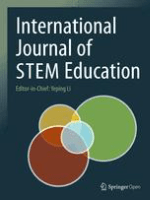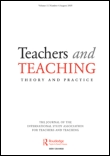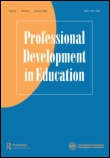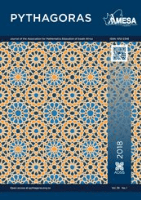
Journal of Mathematics Teacher Education
Scope & Guideline
Advancing Knowledge in Mathematics Teacher Education
Introduction
Aims and Scopes
- Teacher Educator Practices:
This area encompasses the examination of pedagogical strategies and practices employed by mathematics teacher educators to enhance the effectiveness of teaching and learning in mathematics education. - Professional Development:
The journal emphasizes the importance of professional development for mathematics teachers, exploring various models and frameworks to support continuous learning and improvement in teaching practices. - Equity and Inclusion:
A core focus is on addressing issues of equity, diversity, and inclusion within mathematics education, highlighting the need for all students to have access to high-quality mathematics instruction. - Instructional Decision-Making:
Research on how mathematics teachers make instructional decisions, including the factors influencing these decisions and their impact on student learning outcomes. - Technology Integration:
The journal explores the integration of technology in mathematics education, examining how digital tools can enhance teaching practices and student engagement. - Research Methodologies:
A commitment to employing diverse and innovative research methodologies to investigate complex phenomena in mathematics teacher education, including qualitative, quantitative, and mixed methods.
Trending and Emerging
- Research on Collaborative Practices:
There is a growing interest in collaborative inquiry among mathematics teachers and educators, focusing on how partnerships can enhance teaching practices and professional learning. - Teacher Identity and Self-Efficacy:
Recent publications emphasize the importance of teacher identity and self-efficacy in mathematics education, exploring how these factors influence teaching practices and student engagement. - Culturally Responsive Teaching:
Emerging research highlights the significance of culturally responsive teaching practices in mathematics education, aiming to make learning relevant and accessible to diverse student populations. - Digital Technology and Online Learning:
The integration of digital technology and online learning environments is increasingly prominent, with research exploring how these tools can support mathematics instruction and teacher development. - Focus on Equity and Justice:
There is a heightened focus on equity and social justice in mathematics education, with studies investigating how to create inclusive classrooms that meet the needs of all learners. - Interdisciplinary Approaches:
The journal is seeing an increase in interdisciplinary research that connects mathematics education with other fields, such as STEM education, to foster a more integrated approach to teaching and learning.
Declining or Waning
- Traditional Pedagogical Approaches:
There has been a noticeable decrease in research centered around traditional, lecture-based pedagogical approaches, as the field increasingly values more interactive and student-centered methods. - Generalized Content Knowledge:
The journal has seen less emphasis on generalized content knowledge in mathematics teaching, shifting instead to a focus on pedagogical content knowledge and its application in diverse classroom contexts. - Standardized Assessment Practices:
Research on standardized assessment practices in mathematics education is declining, as there is a growing recognition of the limitations of such assessments in capturing students' mathematical understanding and abilities. - Teacher-Centric Research:
Studies that primarily focus on the perspectives and experiences of teachers without considering student outcomes and experiences are becoming less common, reflecting a shift towards a more holistic view of mathematics education.
Similar Journals

International Journal of Education in Mathematics Science and Technology
Exploring new horizons in mathematics, science, and technology education.The International Journal of Education in Mathematics Science and Technology (ISSN: 2147-611X, E-ISSN: 2147-611X) is an esteemed publication dedicated to advancing knowledge and research in the fields of mathematics, science, and technology education. Published by Necmettin Erbakan University in Turkey, this journal serves as a vital platform for educators, researchers, and professionals to disseminate innovative methodologies, pedagogical strategies, and educational technologies. With a commendable Q2 ranking in both the Education and Mathematics categories for the year 2022, it clearly exemplifies its impact in these domains, boasting a Scopus rank of #19 out of 74 in Mathematics (miscellaneous) and a position in the 75th percentile. Although the journal has transitioned into open access, it remains committed to fostering a rich dialogue among scholars and practitioners dedicated to enhancing educational outcomes in mathematics and science. Researchers and educators interested in contributing to pedagogical advancements are encouraged to submit their work, thereby playing a part in influencing the future of education.

International Journal of STEM Education
Shaping the Future of STEM Learning GloballyThe International Journal of STEM Education, published by Springer, is a leading open-access journal dedicated to advancing the field of STEM (Science, Technology, Engineering, and Mathematics) education. With its ISSN 2196-7822 and e-ISSN 2196-7822, the journal has established a significant presence in its domain since its launch in 2014, operating with an increased depth of scholarship through 2024. Hailing from Switzerland and addressing a global audience, the journal has achieved a remarkable ranking of Q1 in Education for 2023, placing it in the top tier of its field. The journal is ranked 26th out of 1543 in Social Sciences - Education according to Scopus metrics, highlighting its influence in shaping contemporary educational practices. By offering a platform for high-quality research articles, reviews, and case studies, the International Journal of STEM Education aims to promote effective teaching methodologies and innovation in STEM pedagogy, catering to researchers, educators, and policy makers alike. The commitment to open access ensures that the knowledge generated is readily available, fostering collaboration and dissemination of cutting-edge developments in STEM education.

Abakos
Connecting research and innovation for a sustainable future.Abakos is a prominent academic journal published by the Pontificia Universidade Catolica de Minas Gerais, focusing on the fields of biological sciences and interdisciplinary studies. Since its transition to Open Access in 2012, the journal has committed itself to the dissemination of high-quality research, providing unrestricted access to innovative findings that advance knowledge in various biological disciplines. Located in Belo Horizonte, Brazil, Abakos invites submissions that address critical issues in the biological sciences, encompassing molecular biology, ecology, and biodiversity, thus contributing to the global dialogue on environmental and health challenges. With an emphasis on advancing research and fostering collaboration among scholars, Abakos serves as an essential platform for researchers, professionals, and students aiming to share their insights and promote scholarly communication in an increasingly interconnected world.

Teachers and Teaching
Connecting Educators with Cutting-Edge InsightsTeachers and Teaching is a premier scholarly journal published by Routledge Journals, Taylor & Francis Ltd, providing an essential platform for researchers, educators, and practitioners in the fields of Education and Arts and Humanities. With an editorial focus on the dynamics of teaching and learning, the journal aims to share innovative research and insightful discussions that enhance pedagogical practices and policy development. Notably, it has achieved a Q1 ranking in both the Arts and Humanities and Education categories, signifying its impact and relevance in educational research, as reflected in its Scopus rankings, with an 84th percentile for Arts and Humanities and a 76th percentile in Education. Although it does not offer open access, the journal provides extensive access options for libraries and institutions, making its rich content available to a wide audience. Spanning from 1995 to 2024, Teachers and Teaching continues to set the standard for high-quality scholarship in the evolving landscape of education, inviting contributions that explore challenges and innovations in teaching methodologies.

REDIMAT-Revista de Investigacion en Didactica de las Matematicas
Advancing the Frontiers of Mathematics EducationREDIMAT-Revista de Investigacion en Didactica de las Matematicas, published by HIPATIA PRESS, is a leading open-access journal dedicated to advancing research in mathematics education, particularly focusing on didactic methodologies and pedagogical innovations. Since its inception in 2012, the journal has fostered an inclusive platform for academics, educators, and practitioners to disseminate their findings and insights, significantly contributing to the field of mathematics education. With an ISSN of 2014-3621, REDIMAT aims to promote high-quality research and collaboration across diverse educational contexts. The journal not only emphasizes empirical studies but also theoretical developments and practical applications that enhance teaching and learning of mathematics worldwide. By providing a valuable resource for researchers, professionals, and students alike, REDIMAT plays a pivotal role in shaping the future of mathematics education research.

STUDIA MATHEMATICA
Championing Rigorous Research in MathematicsSTUDIA MATHEMATICA is a distinguished journal published by the Polish Academy of Sciences Institute of Mathematics - IMPAN, dedicated to advancing the field of mathematics since its inception. With an ISSN of 0039-3223 and an E-ISSN of 1730-6337, this journal serves as a significant forum for mathematicians worldwide to disseminate innovative research and theoretical advancements. Operating under a stringent peer-review process, STUDIA MATHEMATICA boasts a commendable impact factor that places it in the Q2 category within the mathematics discipline, indicating its critical role in the academic community. Covering a broad spectrum of mathematical topics, the journal aims to encourage interdisciplinary collaboration and foster a deeper understanding of both applied and theoretical aspects of mathematics. Researchers, professionals, and students alike will find a wealth of knowledge in its pages, contributing to the development of the mathematics field from its base in Warsaw, Poland. As it converges various strands of mathematical thought from 1996 to 2024, STUDIA MATHEMATICA continues to uphold its reputation as an essential resource for contemporary mathematical scholarship.

Professional Development in Education
Elevating Teaching Practices Through Empirical ResearchProfessional Development in Education is a premier academic journal published by Routledge Journals, Taylor & Francis Ltd, focusing on advancing knowledge and practice in the field of education. Since its inception in 2009, this esteemed publication has achieved a prestigious Q1 ranking in Education and is recognized within the top 12% of its field, evidenced by its Scopus rank of #172 out of 1543 in the Social Sciences Education category. The journal serves as a vital platform for educators, researchers, and practitioners, aiming to foster continual professional growth and enhance pedagogical practices through empirical research, innovative methodologies, and insightful discussions. While it is currently not available as an open access journal, the extensive and rigorous analyses published within play a crucial role in shaping contemporary educational discourse. By referencing state-of-the-art research and critical evaluations, Professional Development in Education stands as a key resource for those dedicated to improving educational outcomes and professional practices worldwide.

Revista Latinoamericana de Investigacion en Matematica Educativa-RELIME
Fostering Innovative Research in Math EducationRevista Latinoamericana de Investigacion en Matematica Educativa (RELIME) is a pivotal open access journal dedicated to advancing research in mathematics education across Latin America. Published by the Comité Latinoamericano de Matemática Educativa (CLAME) since 1997, this journal aims to provide a platform for innovative research, theoretical discussions, and methodological advancements in the field. With an ISSN of 1665-2436 and E-ISSN of 2007-6819, RELIME contributes to the scholarly discourse on educational practices and policies, seeking to enhance the quality of mathematics education. Although currently ranked in the fourth quartile in Education by Scopus, with a social sciences education rank of #1153/1543 (25th percentile), the journal's Open Access policy ensures that research is widely available, thereby fostering collaboration among researchers, educators, and policymakers. Located in Mexico, the journal also emphasizes the unique challenges and successes within the Latin American educational context, inviting submissions that explore local, regional, and broader educational paradigms.

ZDM-Mathematics Education
Inspiring Change in Mathematics Teaching and LearningZDM - Mathematics Education, published by Springer Heidelberg, is a premier academic journal dedicated to the advancement of research and practice in mathematics education. With an impressive impact factor and recognized as a leader in its field, this journal provides a vital platform for disseminating innovative pedagogical strategies, empirical studies, and theoretical discussions surrounding mathematics teaching and learning. The journal operates as a valuable resource for the educational community, holding a distinguished Q1 ranking in both Education and Mathematics categories as of 2023, showcasing its prominence among international academic publications. Covering a broad spectrum of topics, ZDM-Mathematics Education aims to foster collaboration, inspire educational reform, and support the professional development of educators worldwide. With the convergence of years extending from 1997 to 2024, it continues to shape discourse in the domain of mathematics education, appealing to researchers, educators, and policymakers alike.

Pythagoras
Empowering global access to pivotal academic insights.Pythagoras is a pivotal peer-reviewed journal published by AOSIS, dedicated to advancing interdisciplinary research in the fields of Education and Mathematics. Established as an Open Access journal since 2004, Pythagoras amplifies the dissemination of scholarly work, ensuring global accessibility to its contents. With an ISSN of 1012-2346 and an E-ISSN of 2223-7895, this journal plays a significant role within its scope, evidenced by its placement in the Q3 quartile for Education and Q4 for miscellaneous Mathematics categories in 2023, along with respectable Scopus rankings. Operating from South Africa, with a mission to explore the intersections of education and mathematics, Pythagoras invites researchers, educators, and students alike to contribute to its dialogue, fostering innovation and collaboration in these essential fields. The journal’s focus remains on promoting high-quality research that addresses critical challenges and developments within these disciplines, making it a vital resource for scholars aiming to enhance their academic pursuits.